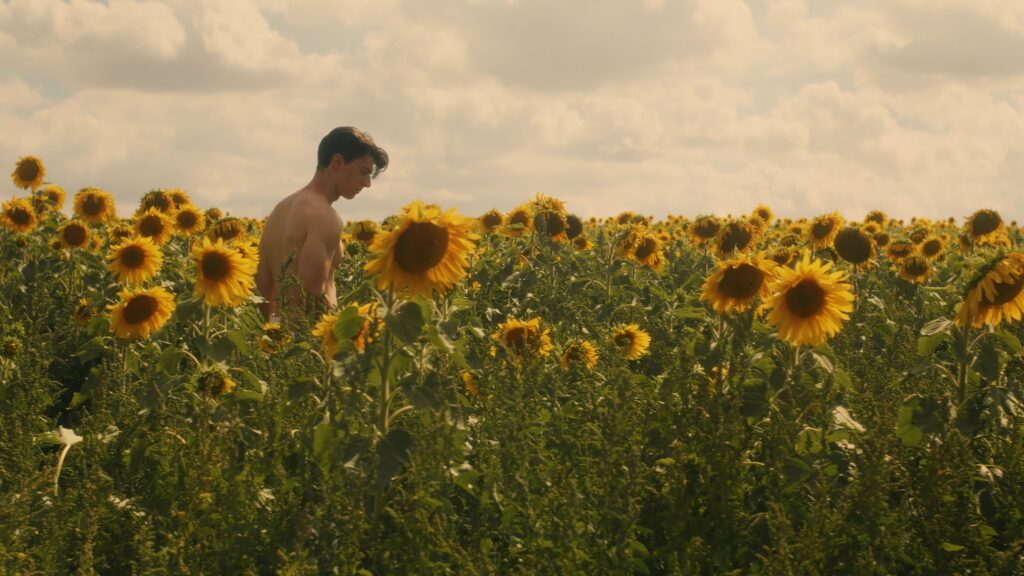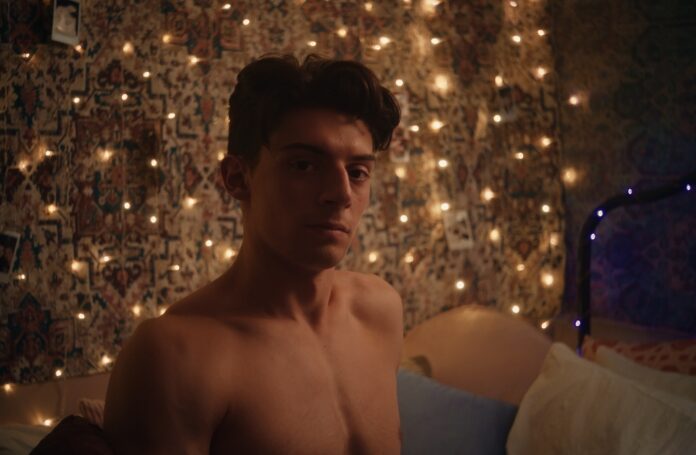The absorbing Australian gay coming-of-age film, “Sunflower,” out Dec. 17 both online and on DVD, opens with 17-year-old Leo (Liam Mollica) walking shirtless through a field of sunflowers crosscut with him being beaten by his homophobic classmates. Out gay writer/director Gabriel Carrubba shows what leads up to this decisive moment as Leo slowly comes to terms with his sexuality.
At first, Leo is seen hanging out with his friend, Boof (Luke J. Morgan), and is concerned about dating Monique (Olivia Fildes). Leo’s parents, Rosa (Diana Ferreira) and Frank (Sal Galofaro), are overprotective, but his brother Gianni (Nelson Blattman) is cool. However, after Leo and Boof kiss, Leo is outed and alienated the next day at school. One student who tries to help the struggling Leo is Tom (Daniel Halmarick), one of Gianni’s friends. Tom is gay, too — only no one else at school knows.
Mollica gives a suitably moody performance as Leo, and Carrubba tells the conflicted teen’s story of self-acceptance with sensitivity. The filmmaker chatted with PGN about his new film.
Is this story autobiographical?
Yes, the film is based on my own experiences growing up in the southeastern suburbs of Melbourne. It is a combination of my experiences from the age of 12 to 18, but I condensed everything into this 3-4-month period for the film. I thought it was the most effective way to tell the story.
What decisions did you make about the episodes from your life to include in the film?
To be honest, I think I held back — there is more that I would have put in the film if I had the guts to. I started writing out memories of things that happened to me. I didn’t think too much about it, but once I had about 80 or so scenes, I started to shape it into a narrative arc. It started as a cathartic experience. I still had to go to therapy after. I still had to exorcise all those demons.
What can you say about developing Leo’s story, which unfolds in a three-quarter flashback narrative structure?
I always wanted to start almost at the climax of the film and work my way to it — how did we end up here? I start at the end because that narrative arc is intriguing to me.
As a character, Leo is sympathetic but also stubborn. What qualities did you want to imbue him with and how did you direct Liam Mollica to play him?
The character of Leo is pretty much what I was like at that age — not wanting any help, very stubborn. I take after my father, who never wants any help. I was like that as a teen. I’ve developed and changed from that. I talked with Liam about how Leo doesn’t want to deal with his identity and accepting help means having to come clean about everything, and that is too painful to deal with. It’s a terrifying prospect to have to tell your parents that you are gay, especially when you grow up in a world where everything is but that. Leo doesn’t want to come out or come to terms with who he is. He’d much rather pretend to be someone who is accepted. I showed Liam a memoir by Shannon Molloy, called “Fourteen.” He wrote about his experiences with high school and homophobia growing up in a small town in Queensland. It speaks directly to that experience of having to hide part of yourself and pretend to be someone you are not.
“Sunflower” features many of the queer coming-of-age film tropes. How did you lean into or avoid the genre elements in making a gay teen coming-of-age film?
I didn’t make an effort to lean away. I just wrote my experience. Trope and cliches exist for a reason; they are true. So many gay men I speak to have the exact same experience as me. My boyfriend lived on the other side of the city from me, but he still had the exact same experience. I did my best to tell my truth, and it happened to fall into genre tropes.
There are some very homoerotic moments between Leo and Boof. There is also a scene in a locker room where Leo is overwhelmed by all the skin he sees. There are several episodes featuring sex, and Leo is frequently shirtless. Can you talk about how you filmed the bodies? It feels very intentional.
It was so important to me. My exact experience was being in the locker room being very aware of who I am and not wanting to look — because I didn’t want to be “that way” — but you can’t help it. The hypersensitivity and awareness of bodies was my relationship to lust. Being the voyeur and being on the outside — you want something so badly, but you can’t have it because you are worried about what society, or your friends will think of you. It’s an integral part of the teenage experience. That was what it is like to be young and hormonal and have that testosterone flowing. You are figuring yourself out. Everything is so hyperaware. Everything is so intense — your emotions, your attractions. So, it was important for me to film the bodies in that way.

I am also curious about how you depicted Leo’s relationship with Tom. It is very gratifying he finds someone who cares for him given the difficulties Leo faces up to this point. What motivated this?
It’s important to have queer joy. Obviously, there is pain in life. My partner is so optimistic about things. I know I can be a pessimist. But knowing at 18 that things are going to be OK, and things are not as bad as they seem [helped]. He said, “There’s never a right time,” to be honest about who you are. I love that Tom and Leo can have that relationship and that sweet friendship. It’s loss, but that loss becomes love. Young people can see the film and see that you can be gay and happy. That was why I wanted to add that into the story. Now I’m ready to move on to projects that talk to the joyful experience of being queer without shame.
Let me ask you a question Leo asks Monique when he sees her painting of sunflowers: What does your film mean? Or, is this more, as Monique says about her paintings, “I guess I don’t really know what they mean sometimes?”
I just write what’s on my mind and if it happens to connect with someone, then that’s fantastic. For me, as long as someone feels something — even if they hate the movie — as long as it makes them feel something, that is the important thing. I’ll leave it to the audience to decipher it and draw their own conclusions.
“Sunflower” blooms on DVD and online Dec. 17.

